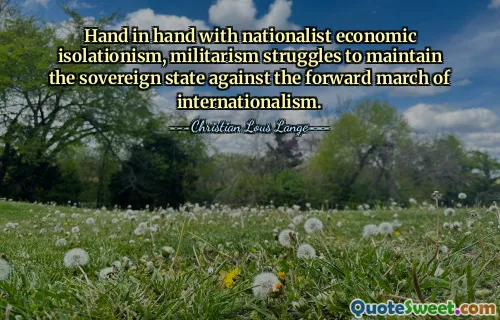Christian Lous Lange was a prominent Norwegian politician and historian, best known for his contributions to international relations and his advocacy for peace. Born in 1869, Lange dedicated much of his life to promoting diplomacy and cooperation among nations. He played a vital role in the establishment of the International Peace Bureau and the League of Nations, highlighting his commitment to conflict resolution and global unity. His efforts were recognized when he received the Nobel Peace Prize in 1921, which underscored his influence in the area of international diplomacy. Lange's academic background in history and political science greatly informed his approach to peace activism. He believed that understanding historical contexts was essential in addressing contemporary conflicts. Lange wrote extensively on the importance of integrating historical knowledge into policy-making, advocating for a future shaped by informed decisions rather than reactive measures. He positioned himself as a mediator who sought to reconcile differing national interests through dialogue and mutual understanding. Despite the challenges of his time, including the aftermath of World War I, Lange remained optimistic about the prospects for lasting peace. He envisioned a world where nations could collaborate peacefully, reducing the likelihood of war through structured international cooperation. His legacy continues to inspire efforts toward diplomatic engagement and reinforces the notion that peace is attainable through persistence and collaboration among countries.
Christian Lous Lange was a notable Norwegian politician and historian, recognized for his work in international relations and peace advocacy. He was committed to fostering diplomacy and cooperation, significantly influencing the establishment of the International Peace Bureau and the League of Nations. His contributions earned him the Nobel Peace Prize in 1921, highlighting his role in promoting global unity and conflict resolution.
Lange emphasized the importance of historical understanding in the realm of peace activism. His academic expertise guided his belief that informed decisions, rooted in historical context, were crucial for effective policy-making. He produced substantial writings advocating for the integration of historical insight into international diplomacy, aiming to mediate conflicts through dialogue.
Mehr anzeigen »
Today Birthdays
1965 -
Nicholas Sparks
1946 -
Diane von Furstenberg
1943 -
John Denver
1874 -
Holbrook Jackson
1830 -
Alexander Smith
1937 -
Anthony Hopkins
1908 -
Simon Wiesenthal
1941 -
Alex Ferguson
1878 -
Elizabeth Arden
1995 -
Gabby Douglas
1977 -
Psy
1944 -
Taylor Hackford
1964 -
Gong Li
1962 -
Lance Reddick
1880 -
George C. Marshall
1954 -
Eric Schneiderman
1990 -
Patrick Chan
1959 -
Val Kilmer
1943 -
Ben Kingsley
1950 -
George Thorogood
1948 -
Donna Summer
1963 -
Scott Ian
1953 -
Jane Badler
1958 -
Bebe Neuwirth
